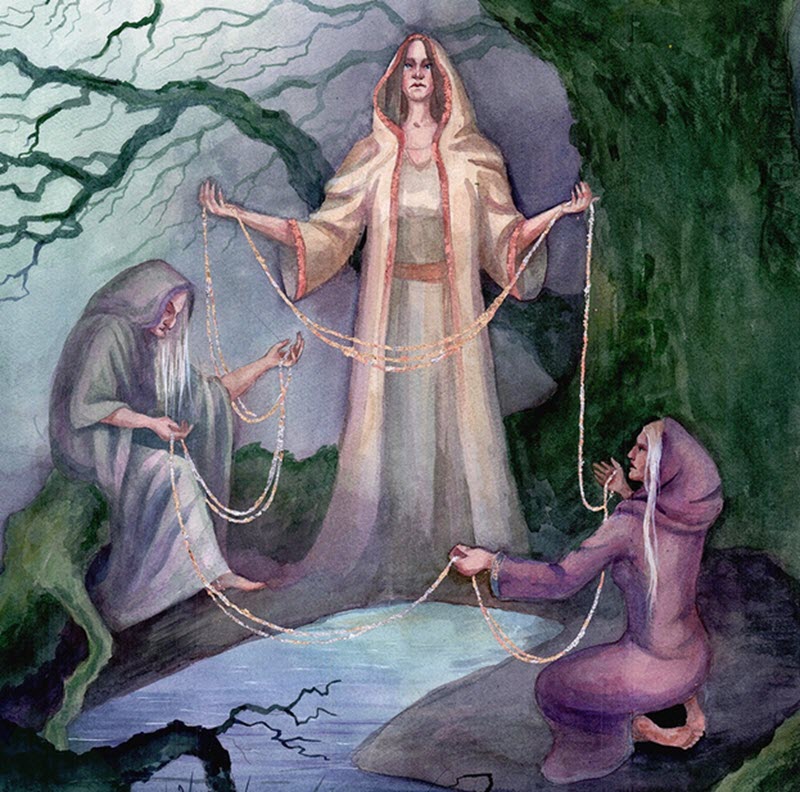In Norse mythology, the Norns are female deities responsible for spinning the threads of human destinies.
According to the Völuspá, the three primary Norns are Urðr (Wyrd), Verðandi and Skuld. They draw water from their sacred well and use it to water and nourish the tree Yggdrasil and prevent it from decaying. Urðr, Verðandi and Skuld are described are powerful maiden Jotuns (gigantesses). When they arrived from Jötunheimr, it ended the Golden Age of the Gods.

This source, the Völuspá, is one of the poems of the Poetic Edda. The name Völuspá means Prophecy of the Völva, and a völva is a type of seerees. In the Völuspá, she tells the god Odin the story of how the world was created and how it will end and be reborn. The poem is preserved in the Codex Regius and Hauksbók, and also partly quoted in the Prose Edda.
The Völuspá is not the only surviving Old Norse source mentioning the norns. They occur in other parts of the Poetic Edda and the Prose Edda, as well as in a number of other sources.
Some researchers say that the three main norns were, respectively, associated with the past, the present, and the future, but there are also experts who argue that this notion is a later one, possibly influenced by Greek and Roman mythology, and that the original norns all represent destiny as it is twined with the flow of time.
Excerpt from the Poetic Edda
|
Þaðan koma meyjar margs vitandi þrjár ór þeim sæ, er und þolli stendr; Urð hétu eina, aðra Verðandi, – skáru á skíði, – Skuld ina þriðju; þær lög lögðu, þær líf kuru alda börnum, örlög seggja. |
Thence come the maidens mighty in wisdom, Three from the dwelling down ‘neath the tree; Urth is one named, Verthandi the next,– On the wood they scored,– and Skuld the third. Laws they made there, and life allotted To the sons of men, and set their fates. |
The translation into English is from “Lays of the gods” by Henry Adams Bellows (1936).
Why are they called the norns?
The origin of the name norn is uncertain. In Old Norse, the singular of the word is norn and the plural is nornir.
It is possible that the name norn is linked to an Old Norse word that means “to twine”, since the norns are twining the threads of destiny.
The researcher Bek-Pedersen have brought up that the Swedish dialect word norna (or nyrna) is a verb that means “secretly communicate”. This could be related to how the norns are frequently described as powerful entities who stay in the background and only occasionally, and in vague language, reveal some of their secrets to gods, humans and other creatures.
Urðr & Verðandi
The Old Norse word Urðr means fate and is a cognate of the Old English word Wyrd (Weird).
Both Urðr and Verðandi are related to the Old Norse verb verða, which means “to become”. It is commonly asserted that Urðr is derived from the past tense of the verb (i.e. “that which becamen or happened”) while Verðandi is derived from the present tense of the verb (i.e. “that which is becoming or happening”).
Skuld
Skuld is derived from the Old Norse verb skulu, which means “need to be / ought to be / shall be”. Skuld means “that which should become” or “that which needs to happen”.
